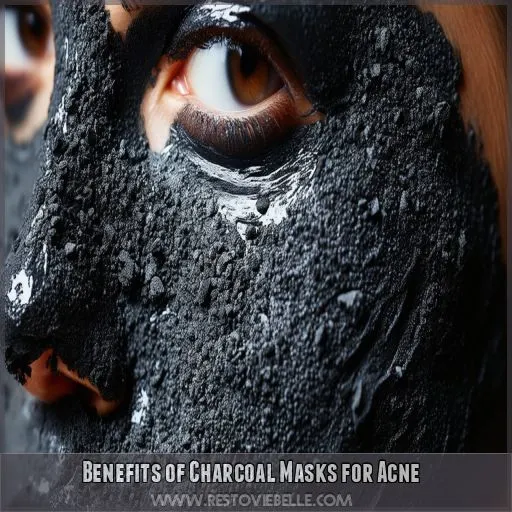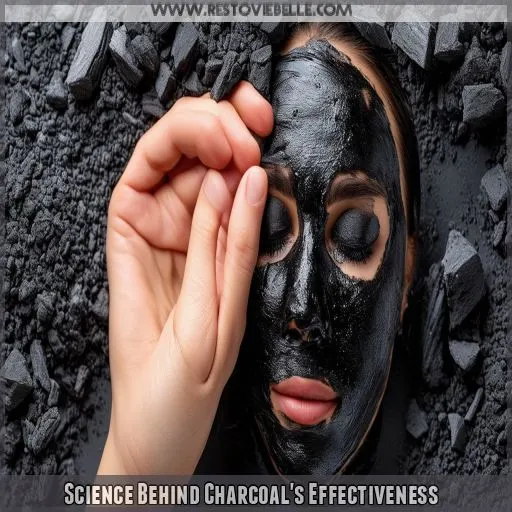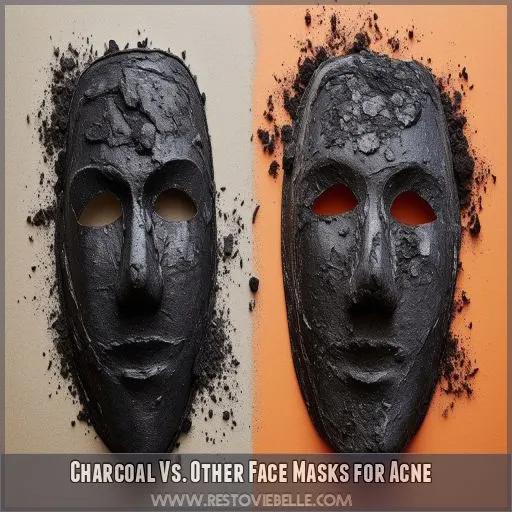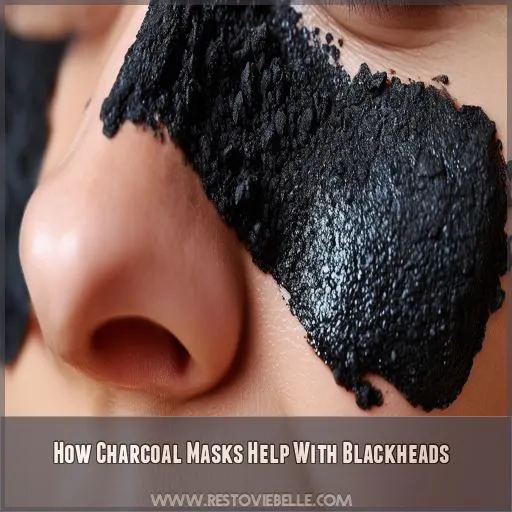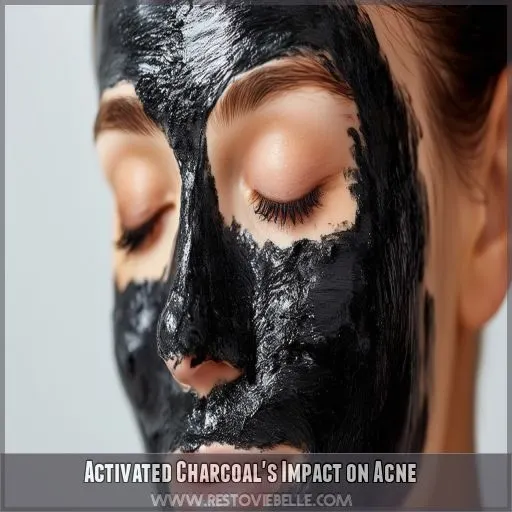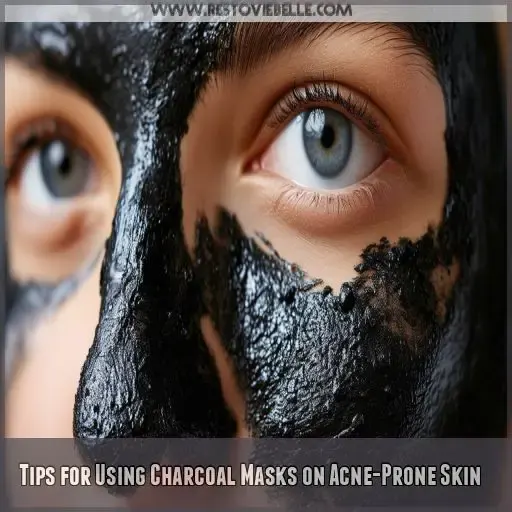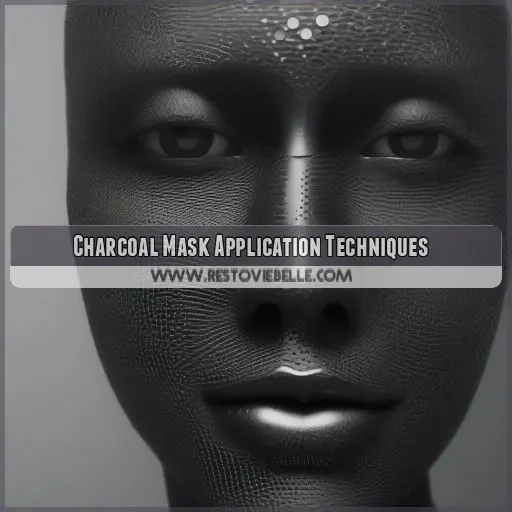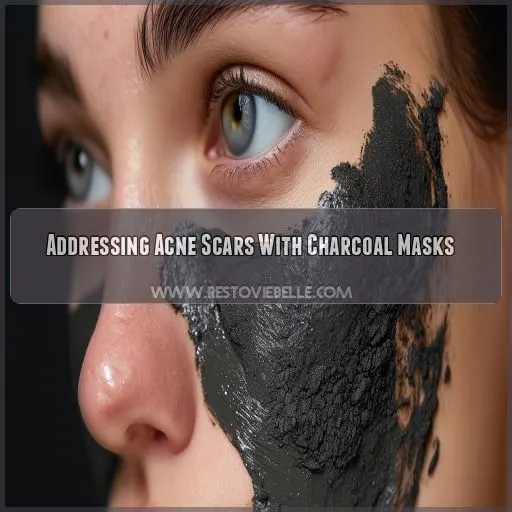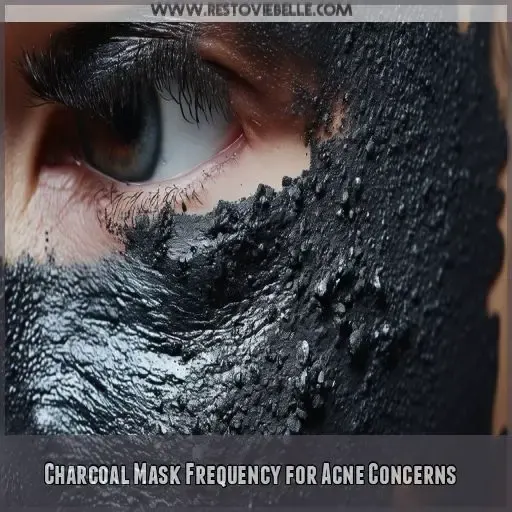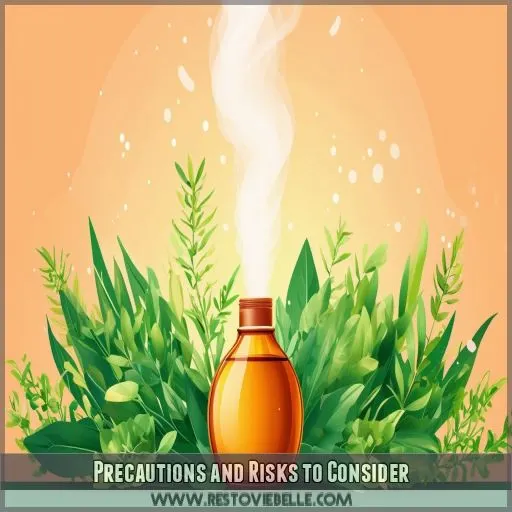This site is supported by our readers. We may earn a commission, at no cost to you, if you purchase through links.
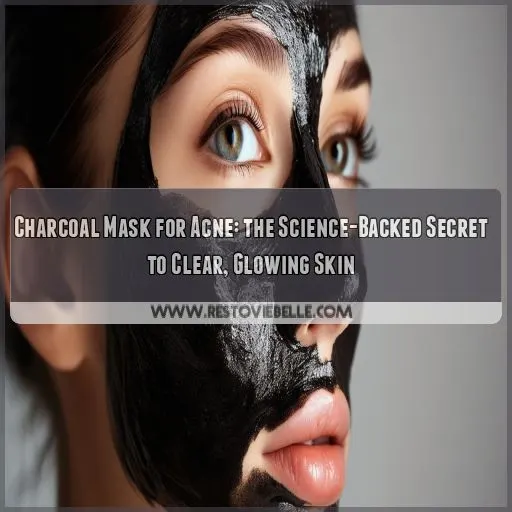 If you’re dealing with acne, a charcoal mask can be a game-changer.
If you’re dealing with acne, a charcoal mask can be a game-changer.
Charcoal masks offer a deep pore cleanse, absorbing excess oil and improving skin texture.
The secret lies in activated charcoal’s ability to draw out impurities.
This article explores the science behind charcoal’s effectiveness, comparing it to other acne treatments.
You’ll learn how to use charcoal masks safely and effectively, addressing acne scars and preventing future breakouts.
Clear, glowing skin is within your reach.
Table Of Contents
- Key Takeaways
- Benefits of Charcoal Masks for Acne
- Science Behind Charcoal’s Effectiveness
- Charcoal Vs. Other Face Masks for Acne
- How Charcoal Masks Help With Blackheads
- Activated Charcoal’s Impact on Acne
- Tips for Using Charcoal Masks on Acne-Prone Skin
- Charcoal Mask Application Techniques
- Addressing Acne Scars With Charcoal Masks
- Charcoal Mask Frequency for Acne Concerns
- Precautions and Risks to Consider
- Frequently Asked Questions (FAQs)
- Is a charcoal mask good for acne?
- Is charcoal actually good for acne?
- What type of face mask is best for acne?
- Does a charcoal mask remove blackheads?
- How often should I use a charcoal mask?
- How long should I leave it on for?
- Is it suitable for sensitive skin?
- What are the risks of using one?
- What ingredients should I look for?
- Conclusion
Key Takeaways
- Charcoal masks can be game-changers for acne-prone skin. They act like tiny magnets, drawing out impurities and excess oil, and leaving your skin feeling refreshed and immaculately clean.
- Charcoal’s absorption prowess isn’t just limited to skincare. It’s even used in emergency rooms to treat certain types of poisoning. Think of it as a super-effective vacuum for your skin, removing all the unwanted gunk.
- While generally safe, it’s important to perform a patch test first, especially if your skin is sensitive. You don’t want to risk turning your face into a red tomato!
- Charcoal masks aren’t magic wands that will make acne vanish overnight. However, with regular use, they can enhance your skin’s texture, lessen breakouts, and even minimize acne scars. So, if you seek a natural remedy to clarify your skin, a charcoal mask is worth considering.
Benefits of Charcoal Masks for Acne
Charcoal masks offer significant benefits for acne-prone skin through their deep pore cleansing and oil absorption properties. These masks can effectively remove impurities and excess sebum while improving skin texture, potentially leading to clearer, smoother skin with regular use.
Deep Pore Cleansing
When you apply a charcoal mask, you’re initiating a potent pore-cleansing force. Activated charcoal operates like a magnet, extracting impurities from the depths of your skin.
This extraction process not only eliminates blackheads but also constricts pores, leaving your face feeling refreshed. As the mask dries, it exfoliates dead skin cells, unveiling a more radiant complexion.
The detoxification properties of charcoal masks make them a preferred choice for acne-prone skin.
Oil Absorption Properties
Charcoal masks are powerhouses regarding oil absorption. They’re like magnets for skin impurities, drawing out excess sebum and toxins from your pores. This detoxifying action helps regulate oil production, reducing pore congestion and improving skin clarity. Bentonite clay, often found in charcoal masks, enhances these oil-absorbing properties, leaving your skin feeling refreshed and balanced.
- Attracts and traps excess sebum
- Reduces shine and oiliness
- Minimizes appearance of enlarged pores
- Helps prevent future breakouts
- Promotes a clearer, more matte complexion
Skin Texture Improvement
While absorbing excess oil, charcoal masks also work wonders for your skin’s texture. They gently exfoliate, removing dead skin cells and unclogging pores. This process reveals fresher, smoother skin underneath.
The mask’s anti-aging properties and hydration boost from ingredients like hyaluronic acid contribute to improved elasticity and overall skin revitalization.
You’ll notice a reduction in blemishes and a more even complexion, giving you that coveted clear, glowing look.
Science Behind Charcoal’s Effectiveness
The science behind charcoal’s effectiveness lies in its unique adsorption properties. When activated, charcoal’s surface area expands dramatically, creating countless tiny pores. This structure allows it to act like a magnet, drawing out impurities from your skin. As you apply a charcoal mask, it penetrates deep into your pores, trapping bacteria, excess oil, and debris. This pore penetration is key to its acne-fighting power.
But charcoal doesn’t stop there. It also helps reduce inflammation and redness associated with acne breakouts. Some charcoal masks even incorporate raw honey, known for its antibacterial properties. The combination can be particularly effective in soothing irritated skin.
Interestingly, charcoal’s absorption abilities extend beyond skincare. It’s used to treat insect bites and even in emergency rooms for specific types of poisoning. Regarding your skin, think of charcoal as a powerful vacuum, sucking out the gunk you don’t want.
Charcoal Vs. Other Face Masks for Acne
Now that you understand the science behind charcoal’s effectiveness, let’s compare it to other types of face masks for acne-prone skin:
- Charcoal vs. Clay Masks: Charcoal masks are ideal for drawing out impurities and excess oil, while clay masks, such as those made with bentonite or kaolin clay, are also effective in absorbing oil and cleansing pores. Clay masks may be a better option for sensitive skin as they’re gentler and less likely to cause dryness or irritation.
- Charcoal vs. Mud Masks: Mud masks, which often contain natural ingredients like aloe vera or tea tree oil, are known for their soothing and anti-inflammatory properties. While charcoal masks focus on deep cleansing, mud masks can help calm and heal inflamed skin, making them a good choice for those with more severe acne.
- Charcoal vs. Peel-Off Masks: Peel-off masks, often made with ingredients like apple cider vinegar and unflavored gelatin, provide a satisfying physical removal of the mask along with any trapped dirt and oil. However, they may not offer the same level of deep pore cleansing as charcoal masks and can be more time-consuming to apply and remove.
- Ingredient Considerations: When choosing a charcoal mask, look for additional ingredients like olive oil or jojoba oil, which can provide extra hydration and help balance the potential drying effects of charcoal.
How Charcoal Masks Help With Blackheads
Charcoal masks are highly effective in the fight against blackheads, and here’s how:
- Clogged Pore Reduction: Charcoal acts like a magnet, drawing out and trapping impurities, excess oil, and toxins from your pores, preventing blackheads from forming.
- Pore Size Reduction: By clearing out the gunk, charcoal masks can help reduce the appearance of enlarged pores, giving your skin a smoother, more refined texture.
- Blackhead Prevention: Regular use of charcoal masks can keep blackheads at bay. The synergy of activated charcoal with ingredients like bentonite and kaolin clay absorbs excess oil, prevents pore clogging, and promotes clear skin.
Activated Charcoal’s Impact on Acne
Activated charcoal’s unique structure and absorptive properties are the key to its effectiveness in combating acne. Its highly porous nature acts like a sponge, soaking up and trapping excess oil, bacteria, and other impurities that can clog pores and trigger breakouts. This makes it especially beneficial for individuals with oily and acne-prone skin.
When incorporating charcoal masks into your skincare routine, it’s important to be mindful of potential skin sensitivities and allergies. While rare, some people may experience adverse reactions to charcoal. Therefore, it’s always advisable to perform a patch test on a small area of skin before applying it to your entire face. Additionally, be cautious of overusing charcoal masks, as their drying effects can lead to skin dryness if used too frequently.
To make sure the quality and safety of your charcoal products, it’s recommended to purchase from reputable suppliers and follow proper storage guidelines. While charcoal masks offer a natural approach to managing acne, they may not be suitable for everyone. If you have concerns about allergies or skin reactions, it’s best to consult a dermatologist to explore alternative treatments or adjustments to your skincare routine.
Tips for Using Charcoal Masks on Acne-Prone Skin
When using charcoal masks to treat acne-prone skin, there are a few key considerations to keep in mind:
- Always perform a patch test before applying any new product, especially if you have sensitive skin. This guarantees that you don’t experience any adverse reactions.
- Charcoal masks are typically recommended for use two to three times a week. Overusing them can lead to skin dryness and irritation, so it’s important to not exceed the suggested frequency.
- Avoid fragrances, dyes, parabens, and other potential irritants, especially if your skin is sensitive. Opt for products with soothing and hydrating ingredients like hyaluronic acid, olive oil, or jojoba oil.
- Don’t leave the charcoal mask on for longer than the recommended time. Typically, 10-20 minutes is sufficient, and exceeding this can lead to dryness and irritation.
- If you find that charcoal masks with clay are too drying, look for alternative formulas that still contain activated charcoal but swap out the clay for hydrating ingredients like aloe vera or hyaluronic acid.
Charcoal Mask Application Techniques
Charcoal masks are an effective tool for achieving clear, glowing skin, and proper application techniques are essential to maximize their benefits. Here are some key considerations for superior results:
- Skin Prep: Make sure your skin is clean and dry before applying the mask. Cleanse your face to remove any makeup, dirt, or oil buildup, creating a fresh canvas for the mask to work its magic.
- Masking Techniques: Apply the charcoal mask evenly across your face, avoiding the delicate eye, nostril, and lip areas. Use gentle, circular motions to massage the product into your skin for better absorption.
- Application Duration: Let the mask sit for the recommended time, typically around 10-20 minutes. This duration allows the activated charcoal and other ingredients to draw out impurities and excess oil effectively.
- Post-Mask Care: After rinsing off the mask with warm water, gently pat your skin dry. Follow up with a lightweight moisturizer to hydrate and soothe your skin.
- Ingredient Sensitivity: Always perform a patch test before using any new skincare product, including charcoal masks. Apply a small amount to an inconspicuous area of skin and wait 24 hours to ensure you don’t experience any redness, itching, or irritation.
Addressing Acne Scars With Charcoal Masks
Now that you’ve mastered the art of applying a charcoal mask, let’s shift our focus to one of the most vexing skin concerns: acne scars. You’re likely all too familiar with the stubborn marks that linger long after a breakout has healed. But the good news is that charcoal masks can be a game-changer in your journey to achieve clear, even-toned skin.
The secret lies in the unique properties of activated charcoal, which extends beyond merely clearing pores and absorbing excess oil. Charcoal masks are like a one-two punch for acne scars, as they not only aid in reducing the appearance of existing scars but also thwart the formation of new ones. Here’s how:
Charcoal masks contain ingredients that foster skin renewal and help mitigate post-inflammatory hyperpigmentation, the darkening of the skin after acne lesions heal. Over time, with consistent use, you may notice that acne scars appear less pronounced and your complexion looks more even-toned.
The exfoliating properties of charcoal masks can help accelerate cell turnover, shedding dead skin cells and revealing newer, healthier skin underneath. This action contributes to gradually fading hyperpigmented areas and creates a brighter, more radiant complexion.
Activated charcoal’s ability to incite collagen production is crucial to enhancing the appearance of acne scars. Collagen is the protein responsible for lending your skin strength and elasticity, and promoting its production helps fill in depressed acne scars and improves the overall texture of your skin. Additionally, the tightening effect of charcoal masks helps to minimize the appearance of enlarged pores, giving your skin a smoother and more refined look.
Charcoal Mask Frequency for Acne Concerns
Regarding the frequency of using a charcoal mask for acne, a balanced approach is crucial. Here are some guidelines to help you find the best charcoal mask timing for your skincare regimen:
- Start with a weekly routine: Include charcoal masks in your skincare regimen once or twice a week. This frequency allows the mask to effectively absorb excess oil and impurities without over-drying your skin.
- Adjust based on skin response: Pay close attention to how your skin reacts. If you experience dryness or sensitivity, reduce the application to once a week or less. Conversely, if your skin tolerates it well and you feel the need for more frequent treatments, you can gradually increase the frequency.
- Pair with a gentle skincare routine: To maintain a healthy balance, ensure you’re using gentle, hydrating products in your daily skincare routine. This helps to counteract any potential drying effects of the charcoal mask and keeps your skin nourished and happy.
Precautions and Risks to Consider
When using a charcoal mask, be aware of potential skin sensitivity issues and the drying effects of overuse. Always conduct a patch test and monitor for any adverse reactions, especially if you have known ingredient sensitivities.
Skin Sensitivity Issues
While charcoal masks are generally safe, it’s crucial to be mindful of potential skin sensitivity.
Each person’s skin is unique and yours may be more sensitive, prone to irritation, or allergic reactions.
To guarantee compatibility, always conduct a patch test on a small area of skin before a full application. This simple precaution helps identify any potential skin issues and prevents discomfort or reactions.
Overuse Drying Effects
Charcoal masks can sometimes cause skin dryness, especially for those with sensitive skin.
This is because activated charcoal is highly absorbent and can strip the skin of its natural oils if used too frequently.
To avoid this issue, it is important to be mindful of how often you use charcoal masks and to always patch test new products on a small area of skin before applying them to your entire face.
If skin irritation occurs, discontinue use and consult a dermatologist.
Ingredient Interaction Concerns
When using a charcoal mask, it’s crucial to evaluate ingredient interactions and potential risks. Here are some precautions and concerns to note:
- Ingredient Safety and Allergies: Always perform a patch test before applying any new product to your skin. Identify potential irritants and be cautious if you have sensitive skin.
- Ingredient Proportions: The effectiveness of a charcoal mask relies on a balanced formula. Excessive or insufficient amounts of certain ingredients can impact results and potentially cause irritation.
- Ingredient Alternatives: If you have known allergies or sensitive skin, seek charcoal masks with alternative ingredients. Opt for fragrance-free options if fragrances are an issue for you.
Frequently Asked Questions (FAQs)
Is a charcoal mask good for acne?
Charcoal masks can be good for acne. The antibacterial properties of activated charcoal may help lift acne-causing bacteria from the pores. However, overuse could cause skin dryness, redness, and sensitivity.
Is charcoal actually good for acne?
Charcoal can be good for acne-prone skin as it draws impurities from the skin. However, there’s no concrete evidence that it’s an effective treatment. It won’t irritate your skin, and it can be used sparingly on dry skin.
What type of face mask is best for acne?
Face masks with charcoal, clay, and salicylic acid are great for acne-prone skin. The Ordinary Salicylic Acid 2% Masque is a popular choice, while La Roche-Posay’s Effaclar Clay Mask is ideal for sensitive skin.
Does a charcoal mask remove blackheads?
Charcoal masks can help remove blackheads, but they can also be damaging to your skin. They work by exposing blackheads to ingredients that dissolve them. However, some ‘blackheads’ removed by masks are actually sebaceous filaments, which protect your skin from bacteria.
How often should I use a charcoal mask?
Charcoal masks should be used once or twice a week, left on for 10 to 15 minutes. Those with more sensitive skin should opt for once a week or once every few weeks.
How long should I leave it on for?
Generally, you should leave a charcoal mask on for 7 to 15 minutes. You should avoid letting it dry completely, as this may dry out your skin. You should also remove the mask early if it becomes uncomfortable or painful.
Is it suitable for sensitive skin?
Charcoal masks can be suitable for sensitive skin, but it’s important to choose the right one. Avoid masks with fragrances, dyes, parabens, and other chemicals. Some masks are designed for sensitive skin, combining charcoal with soothing ingredients like chamomile and lavender.
What are the risks of using one?
Charcoal masks may cause skin dryness, redness, and sensitivity. People with sensitive skin may experience excessive peeling, irritation, or allergies. There’s limited research on the risks, but it’s generally safe.
What ingredients should I look for?
When looking for a charcoal mask, opt for ingredients like clay, honey, and yogurt, which work well with charcoal to sweep away dirt, oil, and toxins. For acne, add probiotics and apple cider vinegar to the mix.
Conclusion
Charcoal masks are a powerful tool against acne. They offer a deep cleanse, control oil, and improve skin texture—a true superhero for achieving clear, glowing skin.
The science backs up charcoal’s effectiveness. With the right application techniques and precautions, you can safely address acne and scars.
Comparing charcoal to other masks and understanding its impact on blackheads will help you make informed decisions about your skincare routine.

